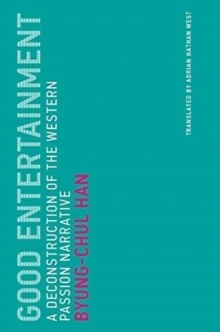Good Entertainment

Editorial MIT Press
Fecha de edición diciembre 2019 · Edición nº 1
Idioma inglés
EAN 9780262537506
Libro
encuadernado en tapa blanda
Resumen del libro
A philosopher considers entertainment, in all its totalizing variety infotainment, edutainment, servotainment and traces the notion through Kant, Zen Buddhism, Heidegger, Kafka, and Rauschenberg. In Good Entertainment, Byung-Chul Han examines the notion of entertainment its contemporary ubiquity, and its philosophical genealogy. Entertainment today, in all its totalizing variety, has an apparently infinite capacity for incorporation: infotainment, edutainment, servotainment, confrontainment.
Entertainment is held up as a new paradigm, even a new credo for being and yet, in the West, it has had inescapably negative connotations. Han traces Western ideas of entertainment, considering, among other things, the scandal that arose from the first performance of Bach's Saint Matthew's Passion (deemed too beautiful, not serious enough); Kant's idea of morality as duty and the entertainment value of moralistic literature; Heidegger's idea of the thinker as a man of pain; Kafka's hunger artist and the art of negativity, which takes pleasure in annihilation; and Robert Rauschenberg's refusal of the transcendent. The history of the West, Han tells us, is a passion narrative, and passion appears as a killjoy.
Achievement is the new formula for passion, and play is subordinated to production, gamified. And yet, he argues, at their core, passion and entertainment are not entirely different. The pure meaninglessness of entertainment is adjacent to the pure meaning of passion.
The fool's smile resembles the pain-racked visage of Homo doloris. In Good Entertainment, Han explores this paradox.
Biografía del autor
Byung-Chul Han (Seúl, Corea del Sur, 1959) es un filósofo y ensayista experto en estudios culturales. Se le considera uno de los filósofos más destacados del pensamiento contemporáneo por su crítica al capitalismo y la sociedad del trabajo. <br> Han estudió Filología Alemana y Teología en la Universidad de Múnich y Filosofía en la Universidad de Friburgo, donde se doctoró con una tesis sobre Martin Heidegger. Ha dado clases de Filosofía en la Universidad de Basilea, de Filosofía y Teoría de los medios en la Escuela Superior de Diseño de Karlsruhe y de Filosofía y Estudios culturales en la Universidad de las Artes de Berlín.<br> Es autor de más de una veintena de títulos entre los que cabe destacar: La sociedad del cansancio, La sociedad de la transparencia, Psicopolítica, No-cosas, Infocracia y Vida contemplativa. Todos ellos han sido traducidos a varios idiomas.<br> El trabajo de Han une tradiciones filosóficas orientales y occidentales, tomando ideas de pensadores como Friedrich Nietzsche, Martin Heidegger, Michel Foucault, Sigmund Freud, Hannah Arendt y Walter Benjamin, entre otros. Explora temas como la tecnología y los efectos del neoliberalismo en los diversos aspectos de la vida humana, el poder, la comunicación, la vigilancia, el consumismo, el trabajo, la autoexplotación, la transparencia, los rituales, la inactividad y las identidades individuales y colectivas; y es considerado como el sucesor de pensadores como Roland Barthes o Giorgio Agamben.








